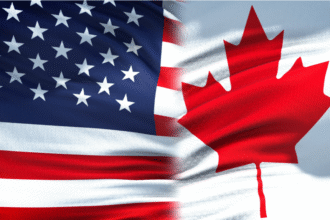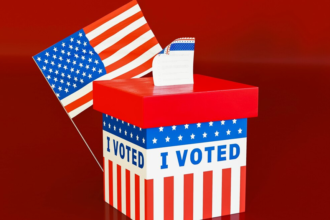Notwithstanding the upheaval his decision to impose broad US tariffs has produced on world stock markets, US President Donald Trump has vehemently defended it. Trump said to reporters riding Air Force One that occasionally “you have to take medicine to fix something.” He underlined that bringing jobs and investment back to the US depends on the US tariffs, thereby assuring the nation will become “wealthy like never before.” His remarks were taken in line with general worries about his trade approach possibly causing a recession in not only the US but also other countries.
- In what ways can these tariffs impact the world economy?
- Does the US run the danger of recession?
- Why Are Tariffs Applied to so Many Different Countries?
- In what ways are other nations responding to Trump's tariffs?
- What is the trade war stance of the United Kingdom?
- Regarding US trade relations, what does the future hold?
- How are Americans reacting to the tariff policy of Trump?
The Trump administration is still determined about the tariffs. Trump’s top officials, in spite of these worries, have reduced the probability of a recession by maintaining that the tariffs would eventually pay off. Still, the fallout has been severe right away. Significant declines in the stock market have left foreign investors questioning whether the US is approaching a serious recession.
In what ways can these tariffs impact the world economy?
Particularly for stock markets, the US tariff decision had instantaneous, broad repercussions. Stock exchanges in Asia dropped sharply following Trump’s remarks. The Nikkei 225 index of Japan sank by 7.8%, while the Hang Seng index of Hong Kong lost more than 12%. The effect was equally strong in the United States. Declining roughly 6%, the S&P 500 suffered its worst week since 2020. All three big US market indexes dropped more than 5% on Friday alone.
Globally, the US taxes raised questions over a more general economic downturn. With a near 7% decline, Saudi Arabia’s stock exchange suffered the largest daily loss since the epidemic started in the Middle East. These declines are a reflection of worries about possible global economic damage should more countries levy retaliatory tariffs or if the trade conflict gets more intense.
Major US banking company JP Morgan projected a 60% likelihood of both a US and worldwide recession after Trump’s tariff declaration. The warning of the financial behemoth gave weight to worries about the trade war possibly spiraling out of hand and causing a global economic crisis.
Does the US run the danger of recession?
Unquestionably, the responses of the stock market are concerning, but Trump has stayed firm in his conviction that US tariffs eventually help the US. He minimized worries of a recession, contending that the trade war was an “adjustment process” that would finally bring US economic conditions under better control. Scott Bessent, Trump’s Treasury Secretary, said unequivocally on NBC’s Meet the Press that the tariffs had “no reason” for one to predict a recession. He underlined once more that the tariffs were a component of a larger plan meant to correct trade imbalances and generate better US economic circumstances.
Bessent further noted that since more than 50 nations had already approached the government to negotiate on trade barriers and taxes, Trump’s approach has given the US maximum influence in trade negotiations. This, Bessent said, proved that Trump’s strategy was producing the expected results.
Still, while Trump’s government supports US tariffs, others contend that more general economic consequences might be terrible. Particularly in sectors dependent on imported commodities, the growing expenses of goods and services resulting from tariffs could tax the US economy. Furthermore driving consumer confidence to new lows are worries about increasing inflation and a possible recession. Higher prices and uncertain employment opportunities may overwhelm any possible long-term advantages from the tariffs for many Americans.
Why Are Tariffs Applied to so Many Different Countries?
Broadly touching a range of goods and sectors, the US tariffs are sweeping in character. Last Monday, the baseline 10% duty on all imports went into force and will stay in place for the foreseeable future. Howard Lutnick, Trump’s commerce secretary, attested to the fact that these tariffs are not merely a temporary fix but rather “stay in place for days and weeks”.
Furthermore, the US is getting ready to apply even more severe duties on goods imported from more than 60 nations, including some regarded as the “worst offenders” for unfair trade policies. These actions will start to show in the next days. Lutnick claims that these new taxes will cover customs charges on a variety of goods thought to be unfairly traded or subsidized. He underlined that, independent of temporary expenses, the US government remained resolved to apply these tariffs.
The wide reach of these tariffs—including even tiny, far-off areas like two Antarctic islands—makes them among the most divisive elements. These areas, which exclusively house penguins, have been added to the tariff list to close “loopholes” for nations like China, which would try to evade taxes by rerouting commodities through these less-known territories. Although the inclusion of these islands seems harsh, the government maintains that it is part of a larger plan to guarantee fair commerce and eradicate chances for undue tariff circumspection.
In what ways are other nations responding to Trump's tariffs?
Many nations have started developing their plans in reaction to US tariffs. While some nations have decided not to respond right away, others have acted forcefully in order to advance their own interests. Following the US decision to put a 32% levy on imports from Indonesia and Taiwan, for example, Indonesia and Taiwan have said they will not levy retaliation duties. This action was considered as an attempt to prevent aggravating the trade war and possibly souring of ties with the US.
By contrast, Vietnam has formally asked that the US postpone applying a 46% duty on Vietnamese exports to the US for at least 45 days. Made via diplomatic channels, the demand emphasizes the rising worry among trade partners about the US tariffs possibly destabilizing their economy.
China, however, has already reacted with a hefty 34% tariff on all US imports, scheduled to take effect on April 10. This counteraction will probably increase hostilities between the two biggest economies on Earth. The Chinese government says these tariffs are required to shield Chinese companies from unfair US trade policies. Experts fear, meantime, that the growing trade war could spread into other areas, therefore influencing world economic stability even more.
What is the trade war stance of the United Kingdom?
The United Kingdom has shown great worry about the continuous trade conflict and the consequences for the world economy. Emphasizing the significant changes brought about by Trump’s aggressive trade policies, UK Prime Minister Sir Keir Starmer cautioned that “the world as we know it has gone.” Starmer underlined that the UK government would keep closely collaborating with the US in search of a means to minimize the negative consequences of the US tariffs. The message of Starmer captures growing worries across Europe about the trade war perhaps endangering their economies as well.
Starmer spoke on the urgency of preventing an all-out trade war on a phone chat with Canadian Prime Minister Mark Carney. Both leaders agreed that more escalation would hurt their own nations as well as the world economy. Starmer’s strategy stresses the importance of international cooperation to stop a disastrous worldwide recession.
Regarding US trade relations, what does the future hold?
Israeli Prime Minister Benjamin Netanyahu was supposed to visit President Trump in Washington, DC, on Monday for crucial trade negotiations. The first visit by an international leader since US tariffs were imposed, Netanyahu emphasizes the significance of US economic relationships with important partners. Enjoying a close personal relationship with Trump, Netanyahu said that their meeting will be a chance to further the ties between their two countries.
How are Americans reacting to the tariff policy of Trump?
Protests over US tariffs have erupted all around the nation. Big numbers of protesters gathered in locations including Boston, Chicago, Los Angeles, New York, and Washington DC to express their disapproval of Trump’s trade policies. Described as the biggest national show of resistance since Trump took office, these demonstrations capture the mounting unhappiness among Americans who worry that US tariffs would cause more expenses and less employment prospects.
Finally, the next weeks probably will bring more changes in the continuous trade conflict. Critics remain worried about the long-term consequences even if Trump and his team maintain that the US tariffs are required to correct trade imbalances and guarantee a better economy. Rising tensions force the globe to observe if these economic “medicines” would mend the US economy or cause a more catastrophic worldwide slump. Only time will decide.








